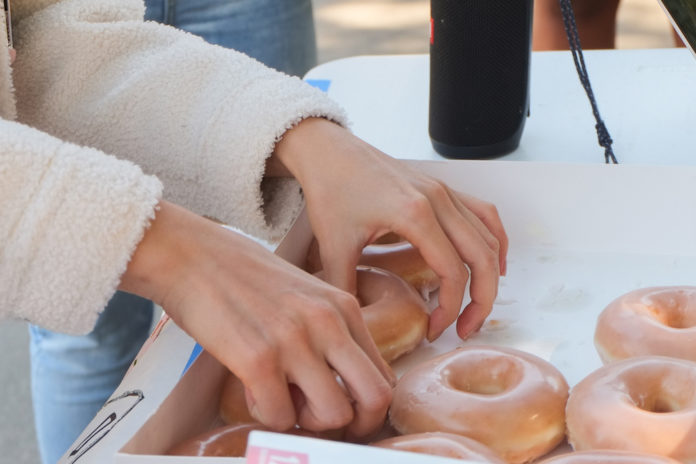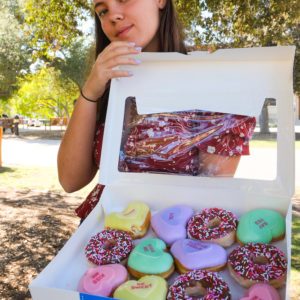
On weekdays during lunchtime, students often find the quad abuzz with various student organizations selling food outside the Marketplace. While student clubs are partially funded by Associated Students of Occidental College (ASOC), organizations in the Tier 1 funding category need to host additional fundraisers to raise money for their events. Periodic Baking, Hawai’i Club and Armenian Students Association (ASA) are three clubs on campus that use food sales to fundraise while also engaging the Occidental community in a dialogue about their respective affinities.
Lara Minassians (junior), co-president of the Armenian Student Association (ASA), said ASA uses food sales to share Armenian culture and raise awareness about issues important to the Armenian community, such as the Armenian genocide. According to Minassians, ASA hosts their own fundraisers because the club is not subsidized by ASOC, and food always entices students. The primary delicacy ASA sells are ponchiks, which are also known as Armenian doughnuts.
“We chose [ponchiks] because it’s the most yummy thing that’s representative of Armenians,” Minassians said. “There’s so much more — [ponchiks] are not even close to encompassing the array of foods we have. But it’s something that people can relate to because it’s like a doughnut, yet it’s Armenian.”
According to Minassians, ponchiks have become popular among students, selling out every time they are offered. Minassians said ASA’s food sales reflect the significance of food in Armenian culture, which she believes may have developed in response to the Armenian genocide.
“There was a lack of food, and 1.5 million people died,” Minassians said. “I think that has something to do with now why Armenians are so big on eating, because that wasn’t something our ancestors had.”
ASA donates the extra money they raise to the Our Lady of Armenia summer camp, a camp for underprivileged and orphaned children in the Armenian village of Tsaghkadzor. Minassians has volunteered as an English teacher at the camp for the past four summers.
“This last summer, [our project] was providing an industrial oven for all the kids, and they made pizza,” Minassians said. “It was amazing to see them enjoy it.”
Hawai’i Club also uses food sales to celebrate and share their culture with Occidental students, according to club president Dylan Shiu (sophomore). Shiu said the club’s goal is to educate Occidental students about Hawaiian culture and provide a place for Hawaiian students to connect.
According to Shiu, Hawai’i Club’s budget fluctuates each semester based on how much money they make from food sales. When they fundraise a lot of money, they are less likely to receive fully funded events from ASOC, Shiu said. The primary food Hawai’i Club sells is spam musubi, a snack made of rice and spam wrapped in nori, or seaweed. Spam musubi is a staple of Hawaiian cuisine, and Shiu said Hawai’i Club’s sales help introduce the delicacy to Occidental students.
“Spam on the mainland is kind of viewed as gross,” Shiu said. “[But] I’ve eaten spam my whole life—it’s one of my favorite foods. Giving people who wouldn’t normally try it the opportunity to try something new is important.”
According to Shiu, the food sales reflect how sharing food is a central aspect of Hawaiian social life.
“All social gatherings in Hawaii are centered around food,” Shiu said. “Because Hawaii’s such a hodgepodge of different cultures and ethnicities, there’s so many different types of food that you get to be exposed to.”
Hawai’i Club’s musubi sales have become popular among Occidental students, with the last batch selling out in 14 minutes, according to Shiu. Hawai’i Club’s biggest annual cultural event is their spring semester luau, which is partially funded by food sales.
This year’s luau will be Apr. 28 and will feature Hawaiian food, hula, singing and ukelele performances. The luau is open to all members of the Occidental community, and Shiu said he hopes many students will attend.

Periodic Baking is another club that uses food for community connection. According to Periodic Baking’s vice president Lauren Chin (senior), the club was created in 2016 by a group of chemistry, biochemistry and biology majors who were passionate about science and loved to bake. Chin said less than half of Periodic Baking’s budget comes from ASOC, and they fundraise the rest through bake sales.
“The main goal for our bake sales is to raise money to support our baking events, since [they are] free for everyone, and anyone can come and bake,” Chin said.
Chin said these events allow students to have fun while also learning about the science behind the food they bake. For example, while baking bread, members of the club have taught attendees about how gluten proteins and water interact, allowing the dough to stretch. Through their events, Chin said Periodic Baking hopes to highlight the universality of chemistry in daily life and make chemistry accessible to non-STEM students.
“As a biochem major, I feel like sometimes chemistry can be intimidating,” Chin said. “I really like putting it in the form of a cupcake or something that one, you can eat — which is fun — and two, [shows] that science is everywhere, and everyone’s doing it.”
Beyond the goal of raising money to supplement their budgets, these clubs use food sales as a platform to raise awareness about important causes and connect the Occidental community to their clubs’ missions.
![]()






























